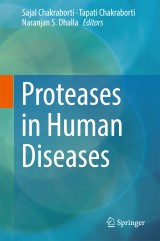Details

Proteases in Human Diseases
|
CHF 236.00 |
|
| Verlag: | Springer |
| Format: | |
| Veröffentl.: | 13.07.2017 |
| ISBN/EAN: | 9789811031625 |
| Sprache: | englisch |
Dieses eBook enthält ein Wasserzeichen.
Beschreibungen
<p>This book bridges the gap between fundamental research and biomedical and pharmacological applications on proteases. It represents a comprehensive overview of the multifaceted field of proteases in cellular environment and highlights the recently elucidated functions of complex proteolytic systems in different diseases. Several established investigators have elucidated the crucial role of proteases in biological processes, including how proteolytic function and regulation can be combined to develop new strategies of therapeutic interventions.</p><p>Proteases form one of the largest and most diverse families of enzymes known. It is now clear that proteases are involved in every aspect of life functions of an organism. Under physiological conditions, proteases are regulated by their endogenous inhibitors; however, when the activity of proteases is not regulated appropriately, disease processes can result in. So, there is absolute need for a stringent control of proteolytic activities in cells and tissues.</p><p>Dysregulation of proteases may cause derangement of cellular signalling network resulting in different pathophysiological conditions such as vascular remodelling, atherosclerotic plaque progression, ulcer and rheumatoid arthritis, Alzheimer disease, cancer metastasis, tumor progression and inflammation. Additionally, many infective microorganisms require proteases for replication or use proteases as virulence factors, which have facilitated the development of protease-targeted therapies for a variety of parasitic diseases.<br></p><p></p>
1. Matrix metalloproteases in breast carcinoma, immunohistology and prognosis.- 2. Matrix metalloproteases in parasite infection.- 3. Cysteine cathepsins: In health and rheumatoid arthritis.- 4. Protective role of antiproteases in radiation induced damage.- 5. Role of proteases in the regulation of N-myristoyltransferase.- 6. Proteases in cancer: Potential therapeutic targets.- 7. MMPs in oral squamous cell carcinoma.- 8. Caspase regulatory mechanisms: Implications in pathogenesis and therapeutics.- 9. Physiological and pathological functions of mitochondrial proteases.- 10. Proteases of parasitic helminths: their metabolic role in establishment of infection in the host.- 11. Cysteine proteases of parasitic helminths.- 12. targeting proteases in urine for bladder cancer diagnosis.- 13. Intramembrane cleaving proteases (ICLiPs), particularly the gamma secretase protease and its role in neurodegeneration, cancer and innate immune signalling.- 14. Contribution of matrix metalloproteases in cardiovascular diseases.- 15. OPG/RANKL-protease axis in cardiometabolic diseases.- 16. Proteases and protease inhibitors in male reproduction.- 17. The role of MMP-2 and -9 in embryonic neural crest cells and their derivatives.- 18. Proteolytic ubiquitin like proteins.- 19. <i>C.albicans</i> aspartic proteases: role of these enzymes in degradation of crucial human host proteins at the place of infection and a possible implications of the protease action for propagation of infection..- 20. MMPs in cancer.- 21. Pathophysiological roles played by proteases of <i>Psedomonas aeruginosa</i>: crucial multifunctional molecules involved in the host infection.- 22. Role of proteases on activating cell death pathways.- 23. varying faces of matrix metalloproteinases in cardiovascular diseases.- 24. kallikreins and kallikrein related peptides (KLKs) in health and disease.- 25. Endogenous proteases in tumoral progression.<br> <p></p>
<p></p>
<p></p>
<div>Dr. Sajal Chakraborti is a Professor of Biochemistry at the University of Kalyani, West Bengal, India. His research covers the role of proteases in regulating pulmonary vascular tone under oxidant and calcium signalling phenomena. He has been engaged in teaching and research in biochemistry for the past 40 years.</div><div><br></div><div>Dr. Naranjan S Dhalla is a Distinguished Professor at the University of Manitoba, Winnipeg, Canada. His expertise includes the subcellular and molecular basis of heart function in health and disease. He has been engaged in multidisciplinary research and education for promoting the scientific basis of cardiology, as well as training of professional manpower for combating heart disease for over 50 years.</div><div><br></div><div>Dr. Tapati Chakraborti is a Professor of Biochemistry at the University of Kalyani, West Bengal, India. Her research covers role of proteases in the pathophysiology of Leishmaniasis. She is also doing research on the role of proteases in regulating pulmonary vascular tone. She has been engaged in teaching and research in biochemistry for the past 30 years.</div>
<div>This book bridges the gap between fundamental research and biomedical and pharmacological applications on proteases. It represents a comprehensive overview of the multifaceted field of proteases in cellular environment and highlights the recently elucidated functions of complex proteolytic systems in different diseases. Several established investigators have elucidated the crucial role of proteases in biological processes, including how proteolytic function and regulation can be combined to develop new strategies of therapeutic interventions.</div><div><br></div><div>Proteases form one of the largest and most diverse families of enzymes known. It is now clear that proteases are involved in every aspect of life functions of an organism. Under physiological conditions, proteases are regulated by their endogenous inhibitors; however, when the activity of proteases is not regulated appropriately, disease processes can result in. So, there is absolute need for a stringent control of proteolytic activities in cells and tissues.</div><div><br></div><div>Dysregulation of proteases may cause derangement of cellular signalling network resulting in different pathophysiological conditions such as vascular remodelling, atherosclerotic plaque progression, ulcer and rheumatoid arthritis, Alzheimer disease, cancer metastasis, tumor progression and inflammation. Additionally, many infective microorganisms require proteases for replication or use proteases as virulence factors, which have facilitated the development of protease-targeted therapies for a variety of parasitic diseases.</div>
<p>Provides a comprehensive investigation into the regulation of proteases and their pathological consequences in health and disease</p><p>Explores the specific inhibitors and molecular probes for proteases to improve therapy for various diseases</p><p>Contains informative resource to improve diverse protease targeted therapeutic approaches of life-threatening diseases</p><p>Includes supplementary material: sn.pub/extras</p>

















